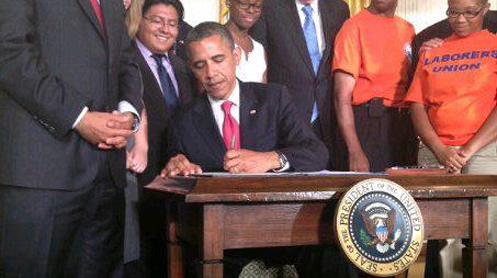
By David Hubbard
 BUSRide stands with the bus and motorcoach industry to offer congratulations — and breathe a long sigh of relief — that Congress managed to pull together and come to an agreement on the next transportation authorization. President Obama signed Moving Ahead for Progress in the 21st Century (MAP-21) in July. MAP-21 extends surface transportation programs through September 2014.
BUSRide stands with the bus and motorcoach industry to offer congratulations — and breathe a long sigh of relief — that Congress managed to pull together and come to an agreement on the next transportation authorization. President Obama signed Moving Ahead for Progress in the 21st Century (MAP-21) in July. MAP-21 extends surface transportation programs through September 2014.
In addition to funding for much-needed provisions in public transit, this legislation also begins to resolve a number of long-standing issues that affect safety and compliance in the motorcoach industry.
If all goes to plan, the new legislation ensures a more disciplined approach to managing and monitoring new entrants in the industry, which should go a long way to corral the rogue operators slithering under the radar whose actions have perpetrated so much misperception.
The stricter policy has essentially criminalized their actions, allowing the secretary of transportation through the Federal Motor Carrier Safety Administration (FMCSA) to increase the penalties for non-compliance and put considerably more sting into enforcement. For instance, the operator who willfully ignores an out-of-service violation, or shows no regard for a cease-and-desist order, can now expect to face a fine of up to $25,000 per incident.
Rather than allow the driver to leave the scene and see the same company suspiciously reappear a week later under a different name in a new location, inspecting officers now have the authority by the secretary to impound vehicles on the spot they deem an imminent hazard to public safety — and can include fleet-wide impoundment.
At the same time, MAP-21 requires state transportation departments to elevate standards and enforcement agencies to demonstrate more diligent inspection programs for buses and motorcoaches as well as trucks.
Without saying as much, the new legislation should give officers pause before pulling over a commercial carrier for a roadside inspection, as MAP-21 now holds the state responsible for the safety and security of the passengers onboard. The inspection process can no longer leave the paying customers unduly stranded and make it the fault of the company in question. The state is responsible for providing and paying for all necessary accommodations. This action should encourage more consideration of where and when to inspect a vehicle other than the terminal or destination. In the case of an imminent hazard that prevents the vehicle from continuing safely, officers might be more diligent in locating a reputable carrier in the area to bring up another coach to transport the passengers.
The process will no longer be as easy for newcomers to the bus and coach business. Before receiving authority to operate, the new entrant must pass a written exam to demonstrate an understanding of the Federal Motor Carrier Safety Regulations (FMCSRs). No more checking the box and signing off without verifiable proof.
MAP-21 further mandates that new passenger carriers undergo a safety review no later than 120 days after receiving operating authority. FMCSA mandates also could impose a registration fee to cover the cost of the new entrant inspection.
A motor carrier previously declared unfit will have to wait three years from the infraction date to apply for new authority. The law further requires a registration update within 30 days of a carrier changing addresses, contact information, officers, process agents and other essential information.
With regard to physical safety enhancements and redesign to vehicles, MAP-21offers flexibility and a considerate timeline reaching to 2017 to allow for science-based engineering and common sense safety improvements with regard to cost and feasibility.
Peter Pantuso, President and CEO of the American Bus Association (ABA) expressed his praise of Congress for having listened and responded in earnest to the industry’s concerns, giving a shout-out to Representatives John Mica, Bill Shuster and John Duncan, who have each taken a very serious interest in motorcoach safety.
